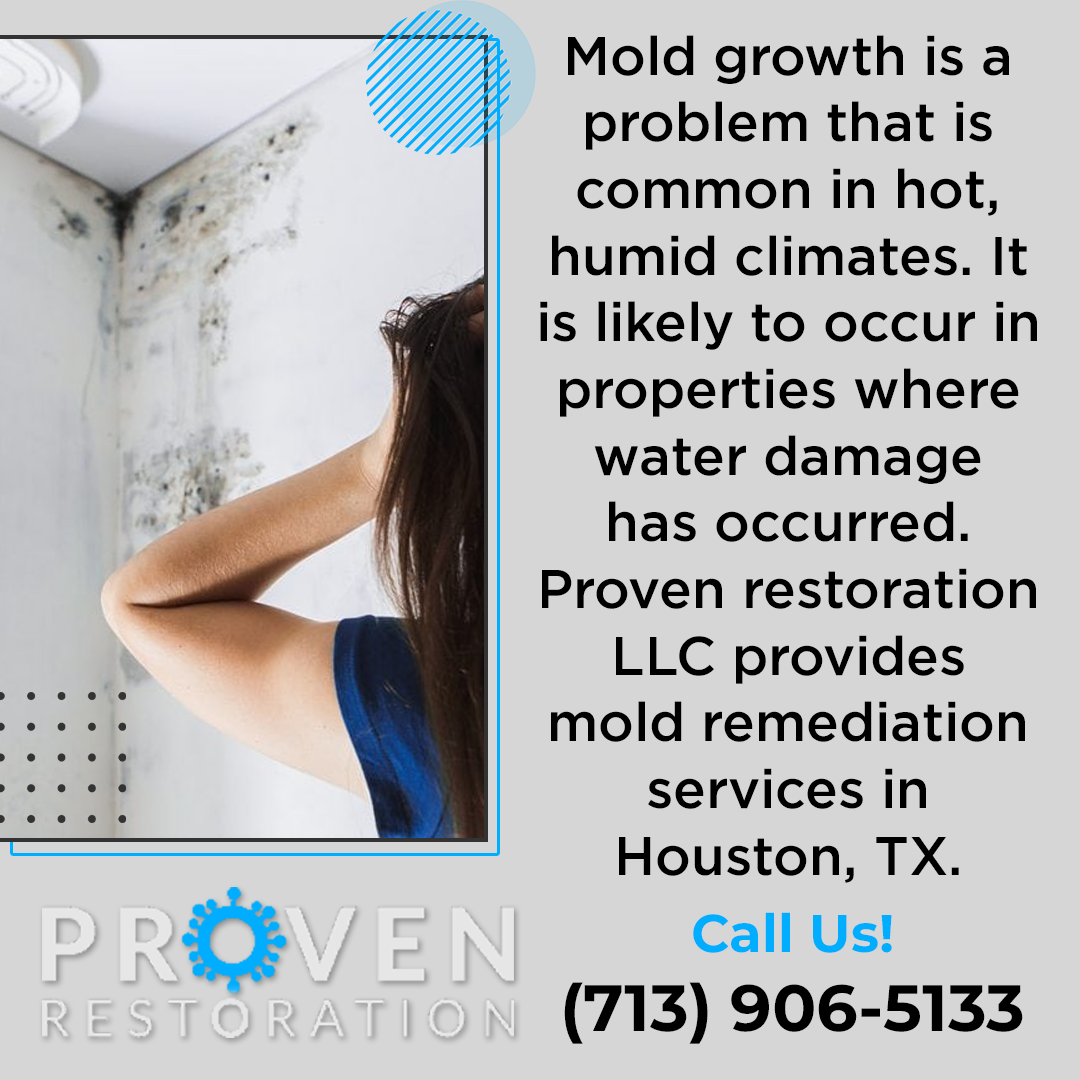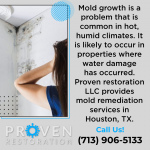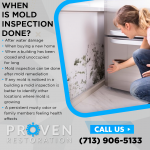The possible losses that can be caused by water intrusion resulting in destructive processes like rotting of wood, rusting of metal, mold growth, bacterial growth, etc constitute water damage. It is estimated that 14,000 people experience water damage at work or at home in the US every year. Mold is one of the possible outcomes of water damage.
Mold is fungi that are a natural part of the environment. They live in moist places like soil, plants, and decaying matter. While outdoors, mold plays an important role in breaking down dead organic matter. However, the mold must be avoided indoors. Mold growth can happen after water damage, especially if it goes unnoticed or unattended. Controlling moisture and reducing mold growth is important to prevent damage to buildings and objects within them, and to avoid potential health issues. Homeowners usually get professionals to tackle mold when there is water damage or they suspect mold growth. Proven Restoration LLC, offers water damage restoration and mold removal services in Houston, Texas. In this article, the company explains the difference between mold inspection and mold remediation.
.png)
Mold is best avoided indoors to prevent damage to surfaces on which it grows. Mold growth can also aggravate allergies or asthma. Mold emits spores that form mold when they land on moist surfaces. To prevent mold growth in homes, they should be kept dry and ventilated, leaks repaired, and proper maintenance of the HVAC system, plumbing, and appliances must be done.
What Is Mold Inspection?
Mold inspection identifies the presence of mold and the area in square footage that is affected by mold.
When Is Mold Inspection Done?
If mold is visible it means it is growing and will spread more. But mold can grow in areas that are not very visible., like in ducts or within walls. A professional mold inspection is advisable in some situations as follows.
- After Water Damage: Any kind of water damage is a risk for mold growth, and mold inspection can help identify it earlier. Any area exposed to moisture can be contaminated by mold if it is not cleaned and dried within 24 to 48 hours.
- When buying a new home: It is safe to have a mold inspection before purchasing a new home. Mold growth that is hidden or due to water damage the prospective buyers may not be aware of can be identified.
- When a building has been closed and unoccupied for long humidity can build up within leading to mold growth.
- Mold inspection can be done after mold remediation to ensure that the mold has been dealt with effectively.
- If any mold is noticed in a building a mold inspection is better to identify other locations where mold is growing that are not readily visible.
- A persistent musty odor or family members feeling health effects can indicate the presence of mold, for which a mold inspection will help.
How Is Mold Inspection Done?
Mold inspection in Texas is to be done by a mold consultant licensed by the Texas Department of Licensing and Regulation (TDLR). It includes a thorough examination of a property including the exteriors, crawl space, attics, basements, and even areas that are hidden from plain view. Moisture levels might be checked and signs of water damage and mold growth will be noted. Samples may be taken to run laboratory tests. These tests help identify the type of mold present, determine how much mold is there, and understand the impact of mold on the indoor environment.
Mold Remediation
Mold remediation is the process of eliminating all harmful mold growth. This specialized process includes the containment, mold removal, and cleaning of mold or mold-contaminated materials. In Texas, companies providing mold remediation are also licensed by TDLR. In certain instances, like areas of visible mold less than 25 contiguous square feet, clean-up by licensed personnel is not required by TDLR.
Mold inspection is done to determine if mold remediation is necessary. It is also done after mold remediation to assess if the process was performed effectively. TDLR usually does not allow the same service provider to conduct mold assessment and mold remediation on the same project. An exception is if the project is for a school district and the school district has employed the mold remediation company. Licensed mold assessors and mold remediators are required to provide clients and property owners with a copy of the Consumer Mold Information Sheet.
.png)
Mold growth is a problem that is common in hot, humid climates. It is likely to occur in properties where water damage has occurred. Proven restoration LLC provides mold remediation services in Houston, Texas. This company has 20 years of experience and can be relied on to provide fast and reliable mold testing and remediation service. Proven Restoration LLC can be approached for competitive estimates for mold remediation and direct insurance billing for this. The company office is in Katy, TX, and can be reached at (713) 906-5133 for mold remediation and water damage restoration service in the Houston metropolitan area.






















